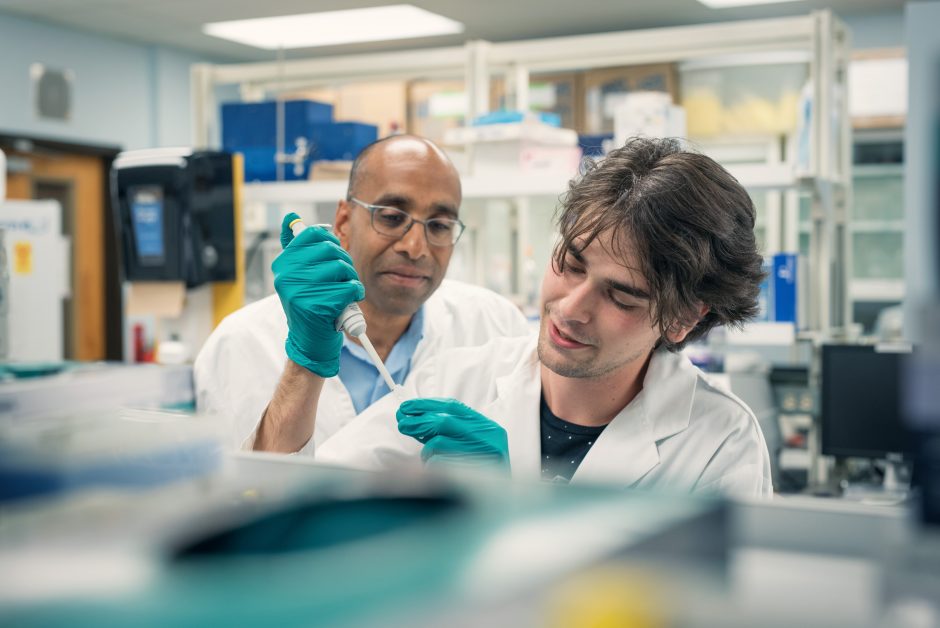
Dr. Kiran Soma (L) studies stress hormones and immune function.
Dr. Kiran Soma recently published his 100th paper entitled “Lymphoid organs of neonatal and adult mice preferentially produce active glucocorticoids from metabolites, not precursors” in the journal Brain, Behavior, and Immunity. This new research, which he co-authored with former UBC Ph.D. student Matthew Taves, explores the role that stress plays in our immune system.
Publishing his 100th paper marks an important milestone for Soma; it occurred during UBC’s Centennial (UBC100). We spoke with him about this new research and his future plans to take this research in a ground-breaking direction.
First of all, what do we know about stress and the immune system?
Since the work of Hans Selye in 1936, we have known that chronic stress severely suppresses the immune system. During stress, the brain signals the adrenal glands to release “stress hormones” such as glucocorticoids into the blood. Cortisol is the major glucocorticoid hormone in us, and it acts on immune cells and many other cells throughout our bodies. In other animals, such as mice, a very similar molecule, corticosterone, is the major glucocorticoid secreted by the adrenal glands into the blood.
What are the new findings in this research?
The current research in mice highlights the critical role that immune organs, such as the thymus, bone marrow and spleen, play in determining their own local hormonal environments. These key immune organs convert an inactive molecule in the blood, 11-dehydrocorticosterone or DHC, into active corticosterone. This research reveals yet another mechanism by which psychological stress can affect the immune system. This is a new way of thinking about stress hormones.
Is there anything in this research surprised and excited you?
We were quite surprised by the tremendous capacity of immune organs to convert DHC to corticosterone, which occurs from early development into adulthood.
Can you tell us about the genesis of this research and how it came together?
This line of research was started about 10 years ago, by a UBC Psychology undergraduate, Kim Schmidt! She was looking for an Honours project, and I suggested this topic. Matt Taves continued this research as a CIHR-funded Ph.D. student in my lab. Matt and I worked very closely with Professor Ninan Abraham (UBC Microbiology and Immunology) and his lab members, who were instrumental for the work. Anastasia Korol, a current UBC Psychology undergraduate, also contributed to this research.
Has this research influenced your subsequent work? Do you plan any follow-up studies?
Jordan Hamden, a M.Sc. student in my lab, and Dr. Cathy Ma, my lab manager, are working on this project currently. We are excited to measure DHC and other steroid hormones using a technique known as liquid chromatography tandem mass spectrometry, or LC-MS/MS. This technique will allow us to measure many glucocorticoids with unparalleled specificity and sensitivity. I recently purchased a state-of-the-art system using my grants from the Canada Foundation for Innovation and the BC Knowledge Development Fund. This system will allow my lab to take the next steps and move this line of work forward in directions that would otherwise be impossible. I’m very grateful to these granting agencies for their support of cutting-edge infrastructure, as well as to NSERC and CIHR for their support since 2004.
Matt Taves is now a CIHR Postdoctoral Fellow at the National Institutes of Health in the US, in the lab of Dr. Jonathan Ashwell. Matt is continuing this line of work, but in a slightly different direction, and studying this process at the level of individual immune cells.
Your 100th publication coincides with UBC’s Centennial. How did you feel when you realized this?
It’s an important milestone for me. That it occurred during the UBC Centennial makes it even better! I feel tremendously lucky to work in a great place with great people.
About
 Dr. Kiran K. Soma is a Professor of Psychology at UBC and a member of the Djavad Mowafaghian Centre for Brain Health and the Graduate Program in Neuroscience at UBC. Dr. Soma joined UBC in 2004. He received his BA from Stanford University, his PhD from the University of Washington in Seattle, and his postdoctoral training at the University of California, Los Angeles. He is a recipient of a Killam Faculty Research Fellowship and a Killam Faculty Research Prize. He has received a New Investigator award from the Canadian Institutes of Health Research, a Scholar award from the Michael Smith Foundation for Health Research, and other merit awards. He was named a Fellow of the American Association for the Advancement of Science in 2015.
Dr. Kiran K. Soma is a Professor of Psychology at UBC and a member of the Djavad Mowafaghian Centre for Brain Health and the Graduate Program in Neuroscience at UBC. Dr. Soma joined UBC in 2004. He received his BA from Stanford University, his PhD from the University of Washington in Seattle, and his postdoctoral training at the University of California, Los Angeles. He is a recipient of a Killam Faculty Research Fellowship and a Killam Faculty Research Prize. He has received a New Investigator award from the Canadian Institutes of Health Research, a Scholar award from the Michael Smith Foundation for Health Research, and other merit awards. He was named a Fellow of the American Association for the Advancement of Science in 2015.